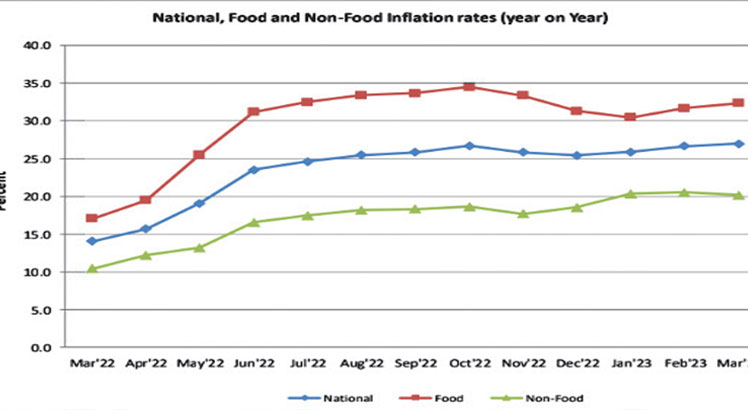Malawi’s head line inflation is fast rising, surpassing the Reserve Bank of Malawi (RBM) and the Treasury target for 2023, recent data compiled by the central bank and the National Statistical Office show.
According to the average inflation rates data, three month inflation rate has averaged 26 3 percent, which is 8.3 and 8.4 percentage points above the RBM’s 18 percent target and government’s 17.9 percent target, respectively.
The RBM, custodians of the monetary policy, during the first Monetary Policy Committee meeting in February, projected that headline inflation would average 18 percent in this year.
On the other hand, when presenting the proposed 2023/24 national budget statement in Parliament Minister of Finance and Economic Af fairs Sosten Gwengwe indicated that in the current financial year inflation would average 17.9 percent.
Inflation has, however, been on the rise since the start of this year to the current 27 percent.
Meanwhile, Cyclone Freddy, which hit the Southern Region last month, has also worsened the outlook for both inflation and economic activity due to the serious damage caused to crops and infrastructure.
Economists have since indicated that the inflation outlook is not promising, and likely to continue rising.
Economics Statistician Alick Nyasulu said in an interview that inflationary pressures are going to persist due to the weather shocks and low production of food.
“Inflation was already on its way up due to food shortages emanating from a low harvest last season. It is also important to note even without the cyclone food-fuelled inflation was likely to surge due to high costs of fertilisers and limited access to subsidy fertilisers.
“Unless there is a huge relief effort to supply food and invest in winter crops, the outlook is not good. I wish the government took control of food pricing through some legislation for select food products,” he said.
Catholic University of Malawi economics lecturer Hopkins Kawaye also indicated in an interview that inflation could be on an upward trajectory this year on account of the weather-related shocks.
The Central Bank has also hinted there will be policy consideration and re-look towards both inflation stability and economic recovery in view of Tropical Cyclone Freddy.
In its February Market Intelligence Report, the central bank said on top of the tightening of monetary policy stance, domestic factors, mostly weather shocks, remain a major risk to the inflation outlook.
In Malawi, maize, as part of the food component, accounts for about 53.7 percent of the consumer price index, an aggregate basket of goods and services used in computing inflation.
Over the past 12 months, maize prices have been on the rise with a 50 kilogramme (kg) of maize reaching as high as K40 000.
Nonetheless, prices have started unwinding with a 50kg bag now fetching an average of K30 000.
The post Q1 inflation average exceeds 2023 target first appeared on The Nation Online.
 Moni Malawi
Moni Malawi 
